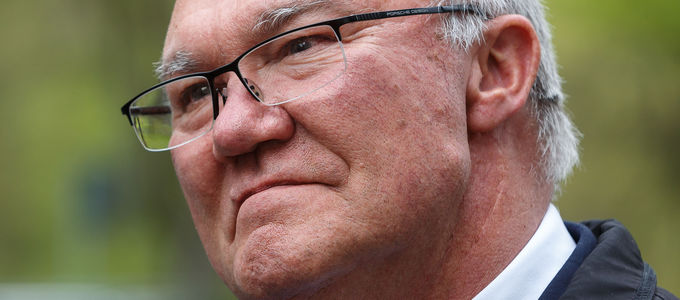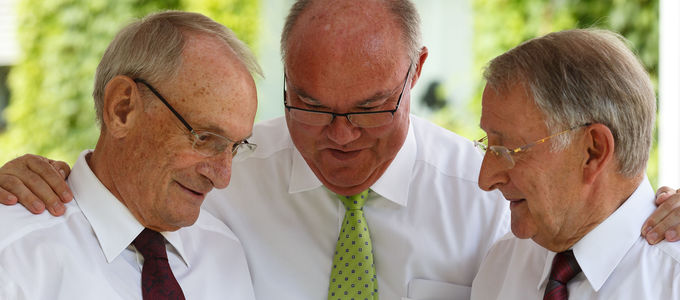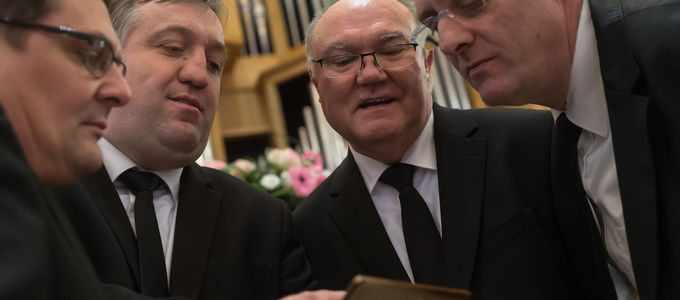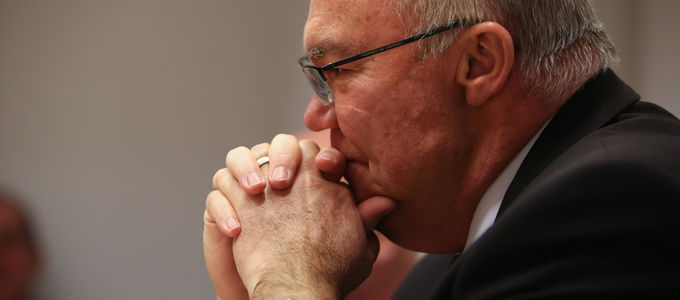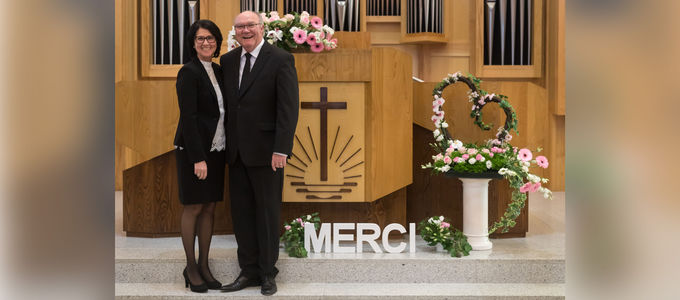
The man with the red safety helmet puts down his hammer. Actually, it should have been a precision mechanical tool. That would have better suited his nature: District Apostle Bernd Koberstein is retiring.
The scene played out in June 2017 in Frankfurt, Germany. Dressed in a construction worker’s uniform, Bernd Koberstein had just finished hammering out a polka on the anvil as a soloist, accompanied by the large youth orchestra of the District Church of Hesse/Rhineland-Palatinate/Saarland. It was his last youth convention as the responsible District Apostle. The motto: “I build with you.”
OBI is the name of a do-it-yourself chain in Germany. And “O-Bi” is what they called him—their “Orchestra-Bishop”, who would spend the traditional rehearsal weekends in the run-up to the annual Day of the Youth with the young musicians, who would listen to them for nights on end, and discuss God and the world with them—and the Church somewhere in between. Here we have a prime example of what distinguishes this minister: Bernd Koberstein is outgoing and wide open to others.
From the lobby to the executive chair
Born as a fourth-generation New Apostolic Christian, Bernd Koberstein grew up in Northern Hesse. In his home congregation he played the organ, sang in the choir, and finally also led the choir. The church path that led him to the Bishop ministry thirty years later began with his calling as a Sub-deacon in 1972.
In the meantime, he also completed his education and training in financial consulting. His professional path led him to Southern Hesse, to various tax offices, and ultimately to the financial faculty of the University of Applied Sciences.
The two paths intersected when District Apostle Hagen Wend found himself in need of a new secretary in 2003—and Bernd Koberstein transferred to the full time service of the Church. Three years later he was ordained an Apostle. But it was no easy path that led him from the lobby to the executive chair of the District Apostle.
Conquering the hearts of the members
His talent for organising, his way of balancing things, and his positive, emotional, Christ-centred sermons: all of this made Bernd Koberstein convincing—even to the members of his own District Church. This was not only true in his time in ministry as a District Apostle at home, but also later on in his ministry, when he assumed the succession of the Chief Apostle in the latter’s homeland: he conquered the hearts of the French members by storm.
And his job here was not an easy one: it involved closing congregations and amalgamating districts. It was time to acknowledge the developments in society. However, his time in ministry involved more than merely dismantling, but also building. He was very deeply involved in the work on the Catechism. He was the one who coined the phrase: “Let us not talk about others—let us talk about ourselves!” And his collaboration with other Christian churches yielded important insights—here too through his personal contacts and encounters with others.
Church leader, minister, friend
At times great strengths can also imply small weaknesses: for example, when the number of your friends in youth suddenly multiplies, or when the District Apostle can personally perform a wedding anniversary blessing—at such times it is difficult to say “no”. Or when patience and forbearance seem inexhaustible where others would have long ago lost their temper. Nevertheless, whenever he saw someone cross the line, Bernd Koberstein was also able to give very definitive correction—with a firm hand, but never harshly.
He will be missed. By the members who love him back because he loved them first. By the many people who have become personally acquainted with him. And by his companions along the way, who at some point would always arrive at a common denominator in conversation with him. “He became a friend to me.” And not only that, he was “a friend who not only laughed with us, but was also able to weep with us.”







